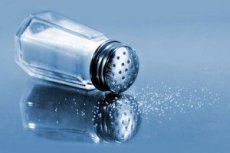Medical expert of the article
New publications
Stress causes people to eat more salty foods
Last reviewed: 01.07.2025

All iLive content is medically reviewed or fact checked to ensure as much factual accuracy as possible.
We have strict sourcing guidelines and only link to reputable media sites, academic research institutions and, whenever possible, medically peer reviewed studies. Note that the numbers in parentheses ([1], [2], etc.) are clickable links to these studies.
If you feel that any of our content is inaccurate, out-of-date, or otherwise questionable, please select it and press Ctrl + Enter.

The results of a new study by scientists led by Dr. Gregory Harshfield from the University of Georgia show that during times of stress, the human body retains excess amounts of salt.
A team of specialists carried out calculations and found that during stressful situations the body is capable of retaining an average of about 160 mg of salt. Approximately the same amount of salt is contained in a small bag of chips.
"Salt, like stress, can increase blood pressure, that is, be the cause of cardiovascular diseases. In addition, the body, regulating the salt content in the body, is forced to get rid of its excess, removing it through the kidneys with urine, along with salt, washing calcium out of the body," say experts.
It is important to monitor your diet, because the recommended daily dose of salt is up to 2.3 grams (the optimal dose is 1.5 grams), while in a stressful situation people usually consume about 3.7 grams.
Research has shown that African-Americans, who participated in the study, succumb to stress, consume more salt and their blood pressure increases significantly.
As a result, by the end of the day, the amount of salt they consume increases by 0.5 grams compared to their usual daily dose. At the same time, their daily diet already significantly exceeds the recommended medical standards for salt consumption.
"Everyone knows that stress, like a diet high in salt, is not good for our health. However, when people are stressed, their bodies crave salt. This can happen several times a day," says Dr. Harshfield.
The author of the study explained that increased salt content in the body can lead to increased blood pressure during sleep, when the body is recovering from daytime activity. According to experts, the most accurate blood pressure readings can be measured at night, because during sleep a person is not affected by external factors and irritants, in particular, stress does not affect him.
Harshfield notes that excess salt can be removed from the body with the help of angiotensin blockers, which are used to treat arterial hypertension, but the most reliable and beneficial method is still moderate salt consumption in food.
Dr. Gregory Harshfield of the University of Georgia and his colleagues continue to work on the project, studying the effects of salt on the human body and patterns of its consumption.


 [
[